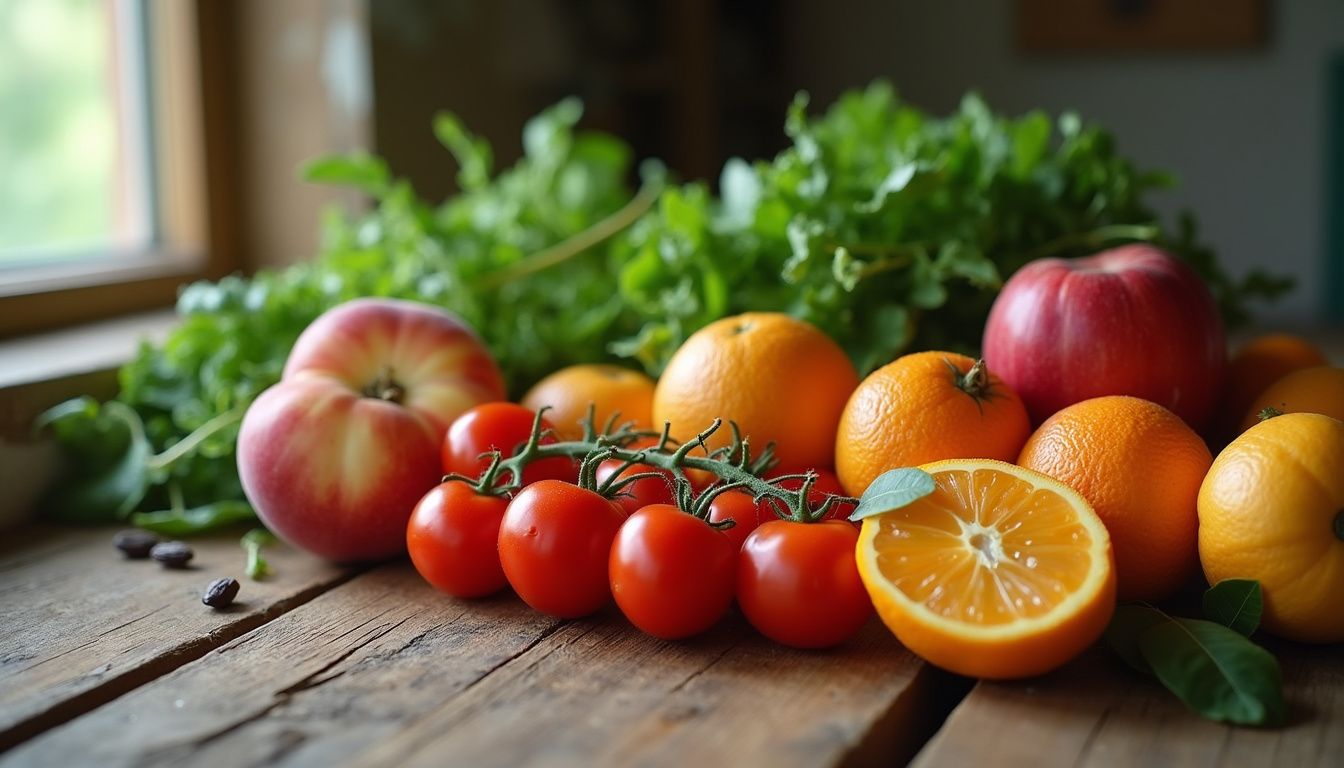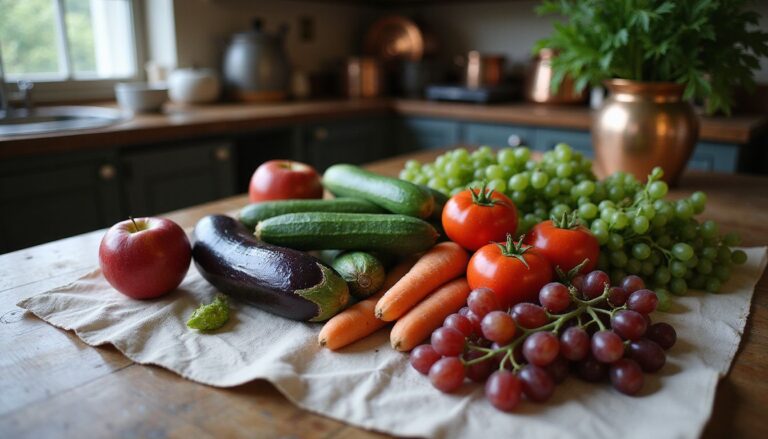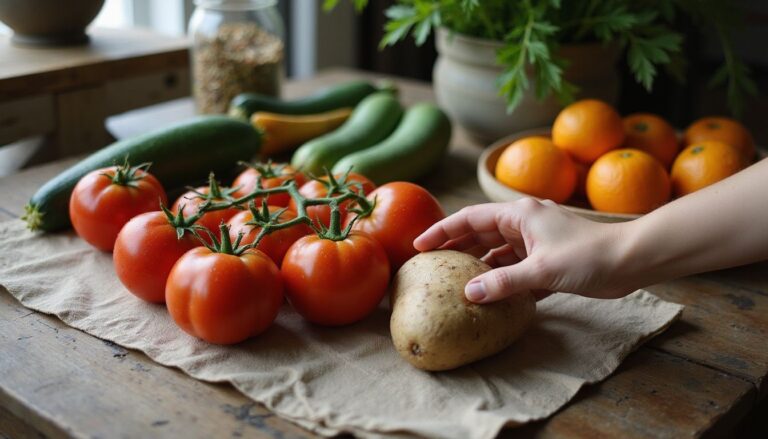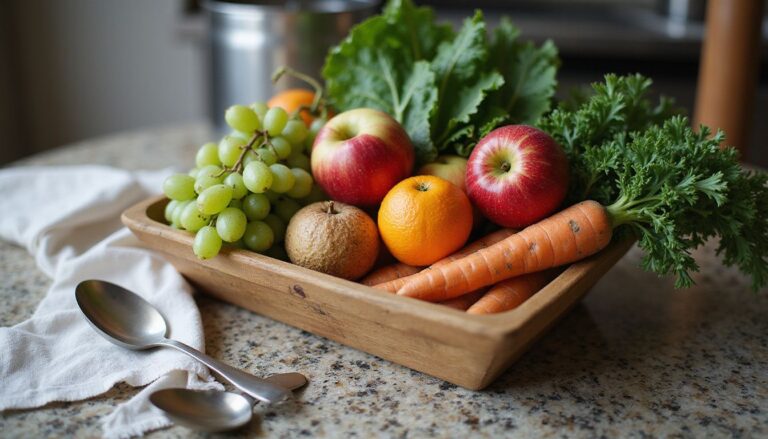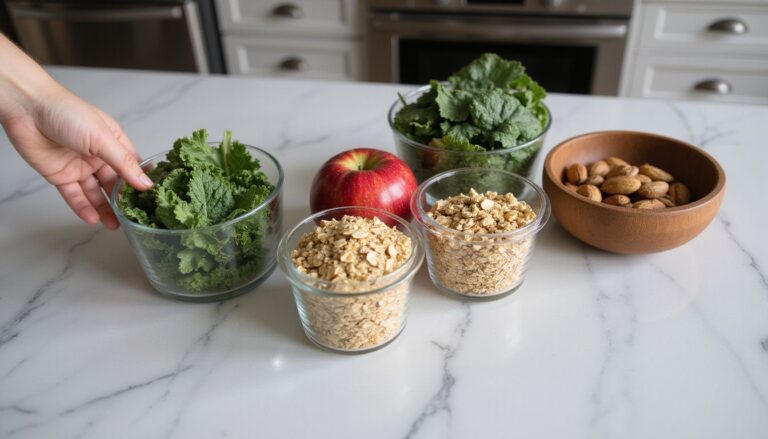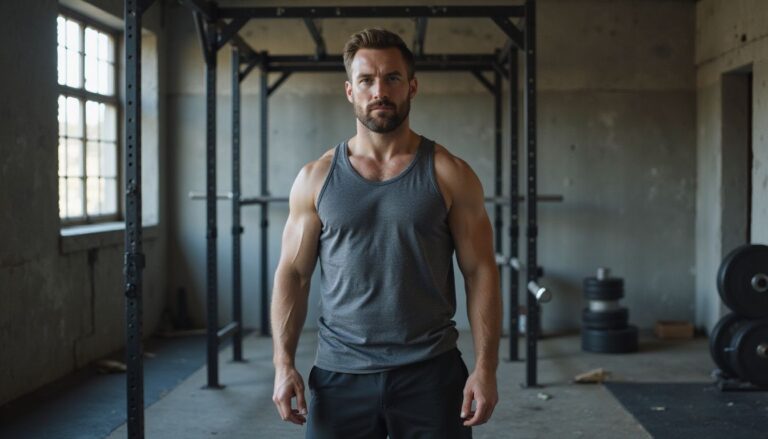Foods For Hair Growth And Thickness: Boost Healthy Hair With These Essential Nutrients
Our Nutrition Assistant AI Suite will transform your body. You will lose fat, get toned, and build muscle. Gain confidence and optimal health.
If you are noticing thinner strands or slower hair growth, you are not alone. Nutrition shapes how your hair looks and feels. A balanced plate gives your scalp the building blocks for healthy hair and can lower the risk of hair loss.
Choosing the best foods for hair growth is a practical first step. This guide explains what to eat, why these nutrients matter, and how to build simple meals that support hair health. Keep reading to learn which everyday foods may help your hair grow thicker and stronger.
Key Takeaways
- High protein foods, iron, biotin, zinc, and omega-3 fats support healthy hair growth and thickness. Good options include eggs, lean meats, fish, beans, nuts, and seeds.
- Iron deficiency is a common cause of hair loss. Low vitamin B12 and zinc may also lead to thinning, especially in people who menstruate.
- Fatty fish such as salmon and mackerel supply omega-3s and vitamin D. Research shows omega supplements can boost hair density in some people with pattern hair loss.
- Leafy greens, berries, whole grains, avocados, yogurt, and other antioxidant-rich foods help calm inflammation and oxidative stress, two problems linked to shedding.
- Limit ultra-processed foods high in sugar and trans fats. These foods raise inflammation and can reduce absorption of key vitamins needed for scalp health.
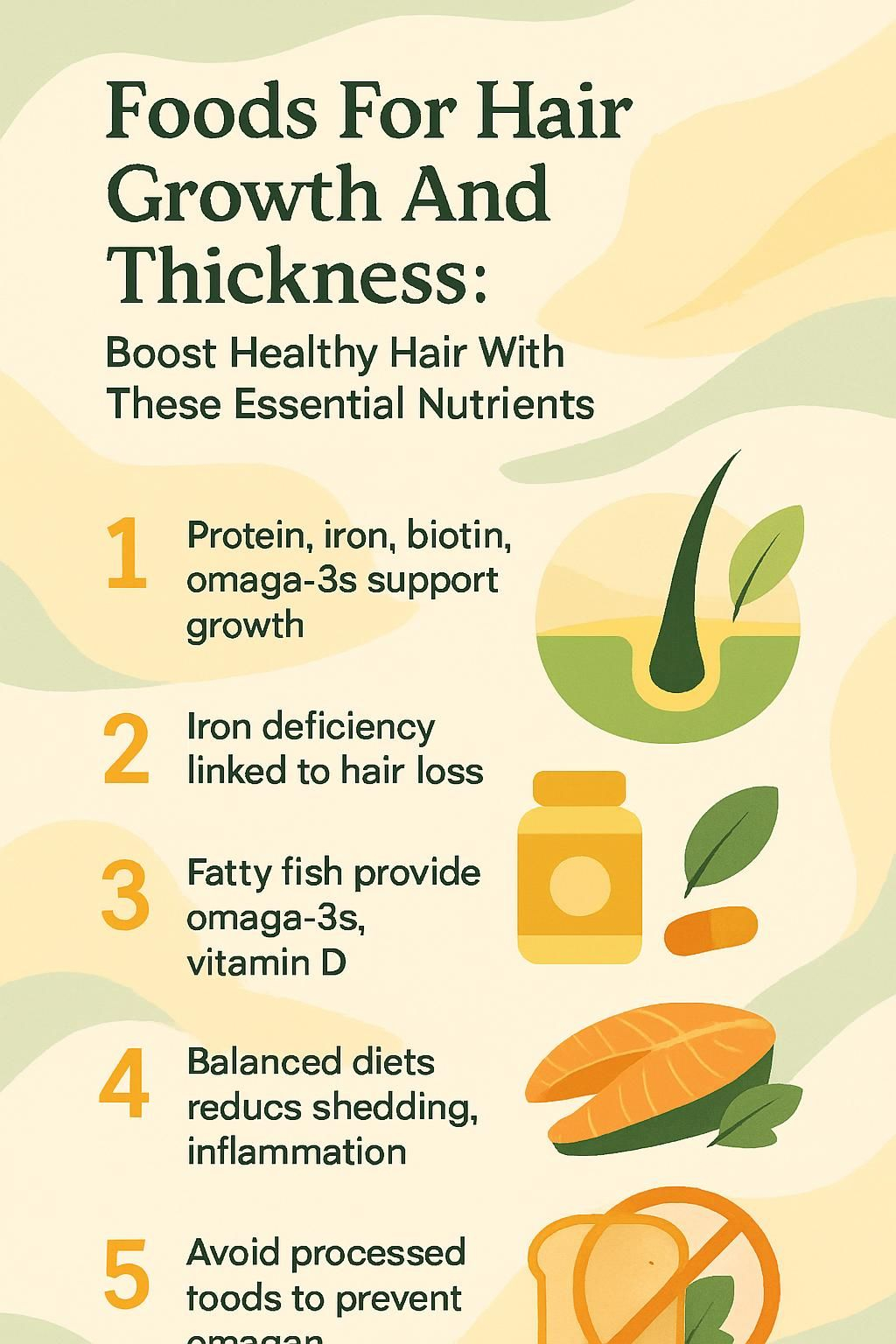
Why Is Nutrition Important for Hair Growth and Thickness?

Your hair is made of protein and depends on steady nutrients to grow well. The right diet supports follicles, which are the tiny structures in your skin that grow hair. When your meals fall short, your scalp may not get what it needs to keep strands thick.
What essential nutrients support healthy hair?
Several vitamins and minerals work together to keep hair strong. A varied diet helps you cover these needs without megadoses.
- Protein: Hair is mostly keratin, a structural protein. Eat eggs, lean meats, beans, or lentils to fuel growth.
- Iron: Iron helps red blood cells carry oxygen to the scalp. Include spinach, beef, chicken, or legumes to prevent thinning.
- Biotin: Also called vitamin B7, biotin supports keratin production. Eggs and nuts are reliable sources.
- Omega-3 fatty acids: Found in salmon, mackerel, chia, walnuts, and flaxseed. These healthy fats support scalp moisture and shine.
- Zinc: Supports oil glands around follicles and helps repair hair tissue. Oysters are rich in zinc; beans provide plant-based zinc.
- Vitamin C: Aids collagen, the protein that supports hair structure. Citrus fruit and berries are easy choices.
- Vitamin A: Supports cell growth and sebum, the scalp’s natural oil. Sweet potatoes provide beta carotene, which converts to vitamin A.
- Vitamin E: An antioxidant that protects scalp cells from oxidative stress. Nuts and sunflower seeds are helpful sources.
- Selenium: Supports new follicle cell formation. Tuna and Brazil nuts contain selenium.
- B vitamins: Riboflavin and B12 support energy metabolism and healthy growth cycles. Get them from dairy, whole grains, leafy greens, fish, and poultry.
Including these nutrients often can reduce diet-related shedding and support steady growth.
How do nutritional deficiencies impact hair health?
Nutrient gaps can disrupt your hair growth cycle. Iron deficiency lowers oxygen delivery to follicles, which can trigger extra shedding. If lab tests confirm low iron, food changes or doctor-guided supplements may help.
Low biotin is rare but can lead to brittle hair. A diet short on vitamin B12 or folate may cause fragile, slow-growing strands, especially for people who avoid animal foods. Protein shortages weaken keratin, so hair becomes thin and breaks easily.
Zinc deficiency can cause telogen effluvium, a temporary condition where many hairs shift into the resting phase and fall out. Vitamin D supports follicle cycling; low levels are linked to scalp and even eyebrow hair loss in some people. Selenium needs a careful balance, since both low and high intake can affect thyroid function and hair health.
The bottom line, steady intake of protein, iron, zinc, vitamin D, and other key nutrients helps protect your strands from avoidable thinning.
Protein-Rich Foods for Hair Growth
Your hair cannot grow well without enough protein. Aim to include a protein source at every meal to support strong strands and active follicles.
How do eggs provide biotin and protein for hair?
Eggs are a simple, complete protein. One egg has about 6 grams of high-quality protein to support keratin, the main protein in hair. Yolks also supply biotin, which your body uses to make keratin and protect against brittle strands.
Eggs contain selenium and zinc as well. Both minerals support hair density and follicle health. If you tolerate eggs, adding one or two a day is an easy way to cover several hair-friendly nutrients at once.
Why include lean meats like chicken and fish?
Lean meats deliver concentrated protein for hair structure with less saturated fat. A 3.5 ounce serving of cooked sirloin has about 29 grams of protein. Chicken provides similar protein with fewer calories.
Fish such as salmon or tuna adds omega-3 fats and vitamin D, which support the scalp and the growth cycle. Lean meats also supply well-absorbed iron and B vitamins that help red blood cells bring oxygen to follicles. Preventing iron deficiency can reduce thinning and shedding.
What plant-based proteins in beans and lentils help hair?
Beans and lentils support hair growth for people who choose a plant-based diet. Black beans provide protein, iron, folate, biotin, and zinc. Zinc matters because low levels are linked with shedding and slower growth.
Lentils add protein plus iron and B vitamins such as folate. Soy foods like tofu contain spermidine. Early research suggests spermidine may extend the active growth phase called anagen, which could support thicker hair.
Pair legumes with nuts or seeds to round out amino acids and healthy fats. This simple habit can help your hair without relying on animal foods.
Omega-3 Fatty Acids for Hair Health
Omega-3 fats help calm scalp inflammation and support moisture. Adding them regularly can improve comfort, shine, and possibly hair density.
Which fatty fish boost hair growth?
Fatty fish provide omega-3s, vitamin D, and other nutrients that support follicles. Consider these options:
- Salmon: Rich in omega-3s, vitamin D, and B vitamins. May help reduce deficiency-related thinning.
- Herring: Offers vitamin D and omega-3s. Low intake of vitamin D is linked to pattern hair loss in some groups.
- Mackerel: Supplies B vitamins, selenium, and iron.
- Sardines: Budget-friendly and rich in protein, calcium, and minerals with anti-inflammatory benefits.
- Anchovies: Small servings pack omega-3s and protein.
- These fish are staples in Mediterranean-style eating, a pattern often associated with healthier hair.
- In a 2015 study, omega-3 and omega-6 with antioxidants increased hair density in women with female pattern hair loss.
How do chia seeds and flaxseeds benefit hair?
If you prefer plant options, chia seeds and flaxseeds are smart choices. Two tablespoons of ground flaxseed provide about 4.7 grams of omega-3 fats. These fats support scalp hydration and may reduce inflammation around follicles.
Chia seeds also supply omega-3s, vitamin E, and zinc, which support thicker strands. Sprinkle ground seeds into yogurt, oatmeal, or smoothies. Pumpkin seeds offer additional plant omega-3s and minerals that support growth.
Why are walnuts good for hair health?
Walnuts contain omega-3s and vitamin E, an antioxidant that shields follicles from free radical damage. This can support shine and help reduce breakage over time.
They also provide biotin and protein. Add a small handful to salads or snacks for an easy hair-friendly boost.
Vitamins Essential for Hair Growth
Vitamins power cell activity in your scalp and follicles. Think of them as small tools that keep the growth cycle on track.
What hair benefits come from vitamin A-rich foods?
Vitamin A supports sebum production, which moisturizes the scalp and hair. Leafy greens like spinach, kale, and lettuce provide vitamin A. One cup of spinach can meet about 20 percent of your daily needs. A medium sweet potato provides about 160 percent.
Carrots and winter squash also help. Both too little and too much vitamin A can be linked to shedding, so aim for food sources and avoid high-dose supplements unless your clinician advises them.
How does vitamin C from fruits help hair?
Vitamin C helps your body make collagen, the protein that supports hair structure. It also improves iron absorption from plant foods. Both actions can reduce breakage and support steady growth.
Strawberries are rich in vitamin C, and yellow bell peppers are one of the highest vegetable sources. Oranges, blueberries, grapefruit, and broccoli are good daily options too.
Why is vitamin E important for hair health?
Vitamin E is a strong antioxidant that helps protect follicles from oxidative stress. Almonds, sunflower seeds, and avocados are excellent sources. An ounce of almonds or sunflower seeds can provide about half of your daily needs.
In one study, people taking vitamin E saw 34.5 percent more hair growth after eight months compared with a control group. Vitamin E may also support scalp blood flow. Food sources are a safe way to raise intake.
Minerals That Support Hair Thickness
Minerals act like switches that turn on key processes in hair growth. Three matter most for thicker strands, iron, zinc, and selenium.
How does iron contribute to hair thickness?
Iron helps carry oxygen to your scalp. When iron is low, the growth cycle can slow and more hair may shed. Iron deficiency is a leading cause of excessive shedding in many people.
Beef provides highly absorbable iron. Leafy greens and whole grains also help, especially when paired with vitamin C foods for better absorption. People who menstruate have a higher risk for low iron and should monitor intake during the reproductive years.
If lab tests show low ferritin or anemia, your clinician may suggest iron-rich foods and sometimes supplements until levels normalize.
What role does zinc play in hair health?
Zinc supports follicle repair and keratin formation. Oysters are one of the richest sources. Shellfish like clams, crab, and shrimp also provide zinc.
Low zinc can trigger telogen effluvium, which is a reversible shedding condition. Plant options include beans, seeds, and nuts. Very high supplemental zinc can create problems, so focus on balanced foods unless a clinician directs otherwise.
Why is selenium important for hair?
Selenium supports thyroid function, which helps regulate growth cycles. Whole grains are good sources. Both deficiency and excess can disturb thyroid balance and may lead to thinning.
Selenium also acts as an antioxidant. You need only small amounts. Avoid high-dose supplements unless your healthcare provider recommends them.
Foods Rich in Antioxidants
Antioxidants protect follicles from free radicals, which can damage cells and speed up breakage. Color on your plate usually means more protection.
How do berries aid collagen production for hair?
Berries like strawberries and blueberries are packed with vitamin C and other antioxidants. One cup of strawberries provides about 85 milligrams of vitamin C, which supports collagen and strengthens the hair shaft.
These antioxidants help defend follicles from oxidative stress. Berries also improve iron absorption from plant foods, which can lower the risk of deficiency-related shedding.
Why eat colorful vegetables for hair protection?
Colorful vegetables such as bell peppers, carrots, squash, broccoli, and leafy greens deliver a wide mix of antioxidants and vitamins. A yellow bell pepper can exceed a full day of vitamin C for many adults. This supports collagen and resilience in hair.
Eating many colors also helps lower inflammation around the scalp. A Mediterranean-style pattern, rich in vegetables and olive oil, aligns with better hair and overall health outcomes.
What are the benefits of green tea antioxidants?
Green tea contains polyphenols and catechins, two antioxidant groups that may reduce inflammation and oxidative stress in the scalp. Less inflammation helps keep hair in the growth phase longer.
Enjoy green tea as a beverage or use cooled tea in a rinse, if your skin tolerates it. Regular intake can complement an antioxidant-rich diet.
Other Beneficial Foods for Hair Growth
Some foods work behind the scenes to improve moisture, balance hormones, and support the scalp’s ecosystem. A few simple swaps can help.
How do avocados support healthy hair fats?
Avocados provide monounsaturated fats, the kind that helps maintain shine and flexibility. A medium avocado supplies about 28 percent of your daily vitamin E. These healthy fats also help your body absorb vitamins A, D, E, and K.
Avocados include antioxidants, vitamin C, B vitamins like pantothenic acid, and potassium for mineral balance. Spread on whole grain toast or add to salads for moisture support.
Why are whole grains good for hair B vitamins?
Whole grains such as oats, brown rice, and whole wheat bread supply B vitamins, including B6 and folate. These help your cells use energy and support follicle function.
Whole grains also provide selenium, which supports thyroid health. Swapping refined grains for whole grains can lower breakage over time.
What hair benefits does yogurt provide?
Yogurt offers high-quality protein plus B vitamins to strengthen strands. Greek yogurt is especially rich in protein. Probiotics in yogurt may support a healthier scalp environment and reduce irritation.
Calcium and vitamin D in yogurt help maintain a steady growth cycle. Enjoy it as a snack with berries and seeds for a nutrient-dense bowl.
Which Foods Should You Avoid for Healthy Hair?
Some foods interfere with nutrient absorption or raise inflammation. Both can make hair more fragile over time.
Why avoid processed foods high in sugar?
High sugar intake can raise inflammation and disrupt hormones that affect follicles. These foods add calories but contribute few vitamins and minerals needed for healthy hair.
Frequent sugar spikes may also affect blood flow to the scalp. Choosing whole foods helps your body absorb iron, zinc, and selenium more efficiently.
How does excessive alcohol affect hair health?
Heavy alcohol use interferes with the absorption of vitamin B3, zinc, and iron. These nutrients support follicles and help prevent thinning.
Alcohol also dehydrates you. A dry scalp can lead to brittle strands that break easily. Limiting alcohol helps your body use nutrients for growth.
What are the effects of foods high in trans fats?
Trans fats raise inflammation and can reduce blood flow to the scalp. This limits delivery of nutrients to follicles and may slow growth.
These fats are common in fried foods, packaged snacks, and some baked goods. Replace them with healthy fats from avocados, nuts, seeds, and olive oil.
What Is a Sample Daily Meal Plan for Hair Growth?
A simple plan helps you cover protein, vitamins, minerals, and healthy fats in one day. Use the ideas below as a flexible template.
What to eat for breakfast to boost hair?
Scrambled eggs provide protein and biotin for follicles. Add sautéed spinach for iron and vitamin A. Top whole grain toast with Greek yogurt for extra protein, B vitamins, and probiotics.
Include berries for vitamin C and antioxidants. Drink water or green tea for hydration and a gentle antioxidant lift.
What is a healthy lunch for hair growth?
Build a chicken salad with beans and nuts. Chicken supplies lean protein and B vitamins. Beans add iron, zinc, and biotin. Nuts contribute vitamin E and healthy fats that protect follicles.
Use leafy greens for vitamin A and antioxidants. Add whole grain bread or brown rice for selenium and fiber. Dress with olive oil and lemon.
How to plan dinner for thicker hair?
Choose salmon for omega-3 fats and vitamin D to support the scalp. Roast sweet potatoes for vitamin A to aid sebum production. Add broccoli for vitamin C to support collagen.
Include quinoa or another whole grain for B vitamins. Add avocado slices for vitamin E and healthy fats. Finish with water to support hydration.
What snacks support hair health?
Snack on almonds for vitamin E and antioxidant support. Add chia seeds or ground flaxseed for omega-3 fats. Yogurt boosts protein and probiotics.
Fresh berries or sliced vegetables add antioxidants and vitamin C. Sunflower seeds offer vitamin E and zinc. Keep a water bottle nearby to stay hydrated between meals.
How Does Hydration Affect Hair Health?
Water supports flexible strands and a comfortable scalp. Aim for at least 64 ounces, or 2 liters, a day. More may be needed in hot weather or with heavy exercise.
Dehydration can lead to dull, brittle hair and slower growth. Consistent hydration also helps move nutrients, like iron and vitamins, to your follicles. The Cleveland Clinic advises steady fluid intake as part of a healthy routine.
When Should You Consider Supplements for Hair Growth?
Supplements can help if lab tests confirm a deficiency. Talk with your clinician before starting any product. Some nutrients can interact with medicines or build up in the body.
Which supplements support hair growth?
- Biotin (B7): Supports keratin production for stronger hair. Often included in multivitamins.
- Vitamin D: Helps regulate the hair growth cycle. Low levels are linked with extra shedding.
- Iron: Essential for oxygen delivery to follicles. Best used if blood tests show low ferritin or anemia.
- Vitamin E: Antioxidant that may increase growth and support scalp blood flow.
- Spermidine: A compound from soybeans that may extend the active growth phase called anagen.
- Omega-3 and omega-6: May reduce inflammation and improve density, especially with antioxidants in some studies.
- Balanced multivitamin: Can cover zinc, selenium, and other gaps when diet is limited.
Work with a healthcare provider to target only what you need and to avoid excess.
When are biotin, vitamin D, and iron supplements needed?
Biotin: Needed mainly if you have a documented deficiency, which is rare. Food sources like eggs, nuts, and whole grains usually cover needs. High-dose biotin can affect some lab tests.
Vitamin D: Consider it if blood tests show low levels. Limited sun exposure or darker skin can raise deficiency risk.
Iron: Use supplements if your clinician confirms iron-deficiency anemia with low ferritin or hemoglobin. Vegetarians and vegans may also need vitamin B12 along with iron.
Keep doses within medical guidance to avoid side effects or nutrient imbalances.
What Lifestyle Tips Complement a Hair-Friendly Diet?
Daily habits can protect your growth cycle and make nutrition work better for you. Small changes often add up.
How does managing stress improve hair health?
Chronic stress can push follicles into a resting phase, which leads to extra shedding. Mindfulness, breathing exercises, and quality sleep help lower scalp inflammation and support better nutrient use.
Regular relaxation can improve how your body absorbs protein, iron, zinc, and other essentials from food.
What is a proper hair care routine?
Start with a nutrient-dense diet that includes protein, omega-3 fats, fruits, vegetables, and whole grains. These provide B vitamins, iron, zinc, and antioxidants for healthy growth.
Drink at least 64 ounces of water daily. Wash with gentle products and avoid overwashing to protect natural oils. Treat your scalp kindly, since healthy skin supports healthy hair.
How does exercise impact scalp and hair health?
Physical activity boosts blood flow, which delivers oxygen and nutrients to your scalp. Better circulation can support stronger, thicker strands.
Exercise also helps balance hormones and reduce stress hormones like cortisol. Many people notice less shedding during stressful times when they keep moving.
Frequently Asked Questions
Here are clear answers to common questions about foods for hair growth and thickness.
Can food alone stop hair loss?
Food can strengthen hair and reduce shedding from deficiencies. You still need enough protein, iron, zinc, and vitamins for healthy hair. Eggs, lean meats, beans, berries, spinach, avocados, nuts, seeds, and fatty fish are smart choices.
Genetics and hormones also affect hair loss, and diet cannot change those causes. If you notice rapid thinning, bald patches, or shedding that lasts more than a few months, see a healthcare professional for evaluation.
Which foods promote faster hair growth?
Eggs supply biotin and protein for follicles. Salmon provides omega-3 fats and vitamin D. Chicken offers high-quality protein for keratin. Beans and lentils add iron and zinc. Berries support collagen with vitamin C. Spinach helps cover iron needs.
A review notes that low iron and vitamin B12 are linked with shedding and weak strands until nutrition improves.¹ Building balanced plates with these foods creates a better environment for growth.
¹Reference: Rushton DH et al., “Nutritional factors and hair loss,” Clinical & Experimental Dermatology 2010; 35(4):404-408
Are supplements necessary for healthy hair?
Most people can meet needs with food. Deficiencies in iron, vitamin D, or other nutrients may require supplements, but only after testing and medical advice. Iron moves oxygen in your blood and supports follicle cells. Low iron can lead to shedding.
Always speak with a healthcare provider before starting any supplement. Some can interact with medicines or with each other.
Conclusion
Food is a powerful tool for hair growth and healthy hair. Protein, iron, zinc, vitamins A, C, D, and E, plus omega-3 fats give follicles what they need to stay active and strong. Filling these nutrient gaps can reduce shedding and support thickness.
If you suspect a deficiency or rapid hair loss, talk with your clinician. This article is for general information and is not medical advice. With consistent, nutrient-rich meals and supportive habits, you create a solid foundation for fuller, stronger hair.
FAQs
1. Which nutrients help hair follicles grow thicker and stronger?
Hair follicles need vitamins, minerals, and proteins to grow well. Nutrients like biotin, zinc, iron, vitamin D, and protein act as cofactors in biochemistry; they help enzymes work so your body can build strong hair.
2. How do cofactors in biochemistry affect healthy hair growth?
Cofactors are helpers for enzymes that control many body processes including those in hair follicles. Without enough of these cofactors such as zinc or iron the cells cannot make new healthy strands or repair damaged ones.
3. What foods should I eat to support my hair’s thickness and health?
Eat eggs for protein and biotin; spinach for iron; nuts for zinc; fatty fish like salmon for vitamin D; beans for plant-based protein. These foods supply essential nutrients that serve as biochemical cofactors supporting each stage of the growth cycle within your hair follicles.
4. Can personal diet changes really improve my own hair growth based on science?
After adding more nutrient-rich foods into my meals over several months I noticed less shedding and fuller texture which matches research findings linking nutrition with better follicle function. Studies show people who lack key dietary cofactors often see weaker or thinner strands until their intake improves.
Summary: Hair needs specific nutrients acting as biochemical cofactors to stay thick and strong including those found in common whole foods such as eggs, leafy greens, nuts, fish, and beans. Eating a balanced diet rich in these elements supports healthy activity inside every follicle leading to visible improvements over time according to scientific evidence.

